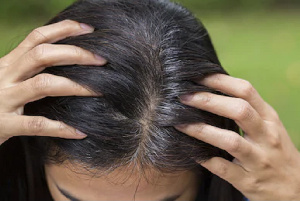BBC Pidgin of Sunday, 23 April 2023
Source: BBC
Scientists fit don discover wetin dey cause grey hair
Scientists for United States of America believe say dem don find out why hair dey turn grey as pipo dey old.
Dem mention pigment-making cells wey lose dia ability to mature.
Di pre-mature development dey affect di cells wey neva mature and e suppose develop into melanocytes wey dey give hair im natural colour or shade.
Di team from New York University (NYU) study di process in mice, wey get identical cells for fur colour.
Dem say di work fit provide a basis to reverse di grey hair process.
According to di British Association of Dermatologists (BAD), work on melanocytes fit also help our understanding and treatment of certain cancers and oda medical conditions too.
How hair dey use turn grey?
We dey grow and lose hair evri time- na normal cycle wey dey happun throughout life.
New hair dey grow from hair follicles, wey dey for di skin, wia di pigment-producing melanocytes dey stay.
Melanocytes dey spoil continuously and renew too. New ones dey come from stem cells and na dis cells wey di researchers believe say don "stick" as identity of pipo wey dia hair don turn grey.
NYU Langone Health team use special scans and lab techniques to study di cell-ageing process.
As hair dey old, e dey fall and e dey grow back evritime, increasing numbers of di melanocyte stem cells go begin dey slow to do dia work.
Di stem cells go den stop to move around di follicle and later dey one place, thereby failing to mature into fully-fledged melanocytes. As e no do im work to produce pigment, di hair go turn grey, white or silver.
"Our study add to our basic understanding of how melanocyte stem cells work to colour hair," study lead investigator Dr Qi Sun, wey be post-doctoral fellow for NYU Langone Health, tell Nature journal.
"Di newfound mechanisms raise di possibility say di same fixed-positioning of melanocyte stem cells fit exist for humans. If so, E present a potential pathway for reversing or preventing greying."
No be di first time scientists don suggest say grey hair fit be a partial process wey dem fit reverse.
Poor nutrition na one possible, treatable cause of premature greying.
Some researchers claim say stress fit contribute to human hair turning white, and dem suggest say removing anxiety fit restore di pigmentation process - at least for a while.
Oda research suggest say genetics, or our DNA, fit partly determine wen we go grey.
While some pipo dey hide grey hair wit dye, odas like am well well. Some even choose to get ahead of nature, and prematurely colour dia hair to silver, white or grey.
According to Glamour Magazine, silver hair na "di spring hair colour trend wey di cool girls dey rock".
"We don see one shade, in particular, taking off. Oyster grey na di fresh, breezy, pearlescent colour trend wey dey crop up all over Instagram," di article tok.
One hairstylist, Luke Hersheson, recently tell British Vogue: "At one point pipo no dey like to get grey hair, but now we no dey equate grey hair wit 'old' age- so many pipo dey do am.
"Post-lockdown, e get one feeling of liberty - many get grey hair sake of say dem bin no fit see dia colourists, but dem come out of di oda side and actually enjoyed di change."
Experts advise say make pipo no dey pluck out 'rogue' grey hairs. E no go stop di next one wey go grow from di same follicle from being grey. If you damage di hair follicle, e fit dey hard for new hair to grow, meaning you fit dey wit less hair or even bald patches.
Dr Leila Asfour from di British Association of Dermatologists tell di BBC work on hair colour was big business: "Di global hair colour market dey projected to reach a value of $33.7bn by 2030. Clearly pipo want am.
"Di obvious implication of dis research, wen e come to di general public, be say na one step closer to finding a way to reverse our grey hairs.
"But dis study results help di medical field understand beta conditions wia dis stem cells fit get role to play- for example, understand di underlying nature of di deadliest skin cancer we treat wey be melanoma."
E fit help wit a medical condition called alopecia areata too, wia di immune system dey attack di hair wey dey make am fall out. Sometimes di hair go grow back white for dis patients body, she explain.
And e fit give more clues about vitiligo - one skin condition wia patients dey develop white skin patches.
Scientists don try surgically bybplacing hair follicles for di affected areas to help regenerate di colour from di pigment wey dem see for di hair follicle.
"We need more research," Dr Asfour tok.
Dr Yusur Al-Nuaimi from di British Hair and Nail Society say scalp health bin dey important for supporting good head hair growth, especially as we dey old.
"Di recent study in mice don add to our understanding of di hair follicle and how di pigment-producing cells dey function. We don already dey discover more about di potential of stem cell therapies for conditions including hair loss and studies like dis one, wit new findings about di colour-producing cells, fit lead to plenti treatment options for our patients in future."
Entertainment













